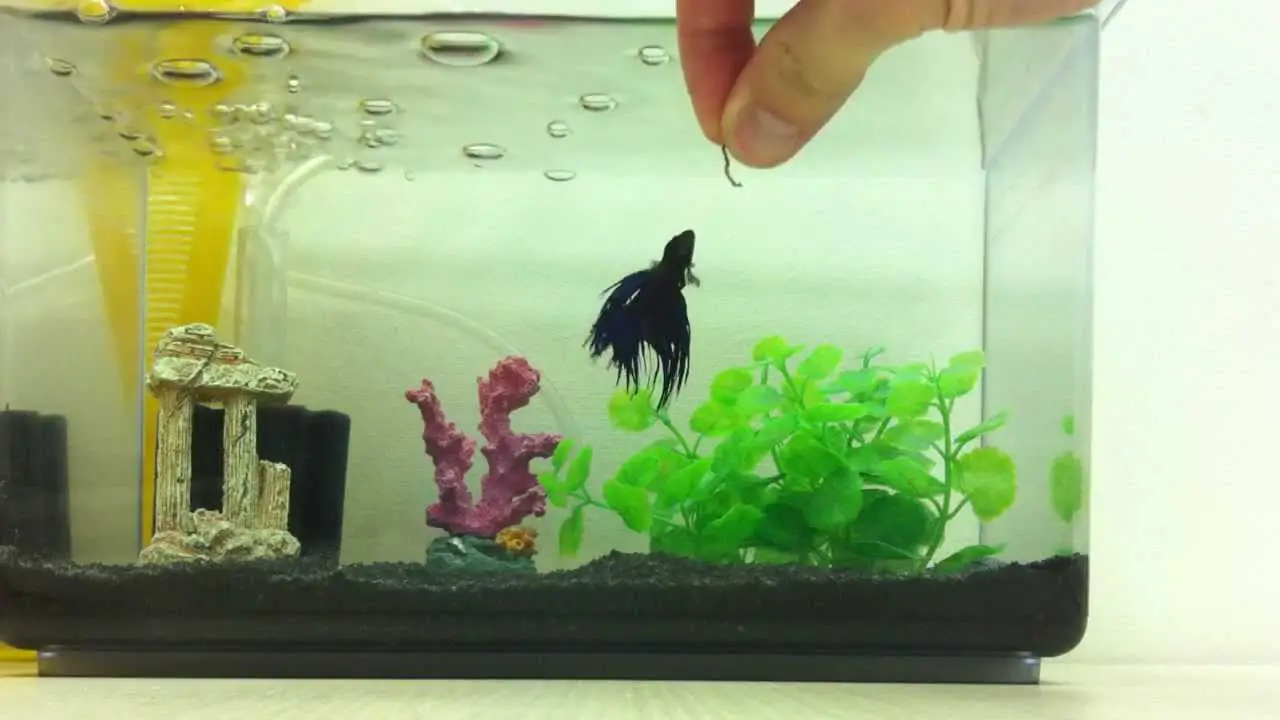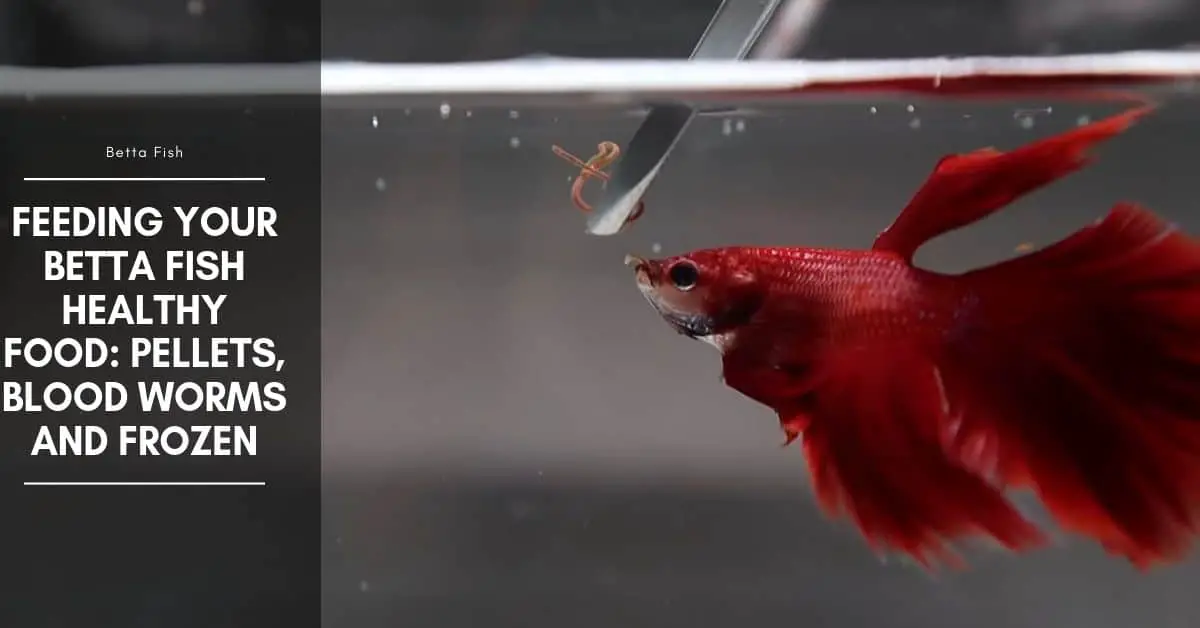Originally posted on May 12, 2023 @ 7:00 am
Last Updated on 6 months by admin
Betta fish are a popular choice among aquarium enthusiasts due to their vibrant colors and unique personalities. However, as with any pet, it’s important to ensure they are properly fed and cared for. One question that often arises for betta fish owners is how often they should feed their fish bloodworms, which are a common food choice for these carnivorous creatures.
While bloodworms can be a nutritious addition to a betta fish‘s diet, feeding them too frequently or in excessive amounts can lead to health issues. In this article, we will explore the ideal feeding schedule for betta fish and provide tips on how to ensure they are getting the proper nutrients they need to thrive. So, let’s dive in and feed our knowledge on betta fish feeding habits!

How Often Should You Feed a Betta Fish Bloodworms?
Betta fish, also known as Siamese fighting fish, are one of the most popular types of aquarium fish in the world. These beautiful and colorful fish are native to Southeast Asia and are known for their aggressive behavior and territorial nature. Feeding your betta fish a healthy and balanced diet is essential for their overall health and well-being. In this article, we will discuss how often you should feed your betta fish bloodworms and the benefits of including them in their diet.
What are Bloodworms?
Bloodworms are a type of aquatic worm that are commonly used as a food source for aquarium fish. These worms are rich in protein, vitamins, and minerals, making them an excellent addition to your betta fish’s diet. Bloodworms are typically sold either live or freeze-dried and can be found at most pet stores that sell aquarium supplies.
When it comes to feeding your betta fish bloodworms, it’s important to keep in mind that they should not be the only food source in their diet. While betta fish do enjoy bloodworms and can benefit from their nutritional value, they also need a varied diet that includes other types of food such as pellets and flakes.
How Often Should You Feed Your Betta Fish Bloodworms?
When it comes to feeding your betta fish bloodworms, it’s important to do so in moderation. While bloodworms are a nutritious food source, feeding them to your betta fish too often can lead to health problems such as obesity and digestive issues.
As a general rule of thumb, you should aim to feed your betta fish bloodworms once or twice a week. This will provide them with the nutritional benefits of the bloodworms without overfeeding them. It’s also important to remember that you should only feed your betta fish as much as they can eat in a few minutes. Overfeeding can lead to health problems and can also cause the water in your aquarium to become dirty and polluted.
The Benefits of Feeding Your Betta Fish Bloodworms
Feeding your betta fish bloodworms can provide them with a range of nutritional benefits. Bloodworms are rich in protein, which is essential for muscle growth and repair. They also contain vitamins and minerals such as vitamin E, calcium, and magnesium, which help to support your betta fish’s overall health and well-being.
In addition to their nutritional benefits, bloodworms can also help to stimulate your betta fish’s natural hunting instincts. Betta fish are predatory by nature, and feeding them live or freeze-dried bloodworms can provide them with a fun and engaging way to exercise and stay active.
Bloodworms vs. Other Types of Food
While bloodworms can be a nutritious addition to your betta fish’s diet, it’s important to remember that they should not be the only type of food that you feed them. Pellets and flakes are also important sources of nutrition for your betta fish and should be included in their diet.
Pellets and flakes are typically formulated to provide a balanced diet that includes all of the essential nutrients that your betta fish needs to stay healthy. While bloodworms are rich in protein, they do not contain all of the essential vitamins and minerals that your betta fish needs to thrive.
Conclusion
In conclusion, feeding your betta fish bloodworms can be a nutritious and fun addition to their diet. However, it’s important to do so in moderation and to also include other types of food such as pellets and flakes. By providing your betta fish with a varied and balanced diet, you can help to ensure their overall health and well-being.
Frequently Asked Questions
How often should you feed a Betta fish bloodworms?
Betta fish are carnivorous, and they enjoy eating live or frozen foods such as bloodworms, brine shrimp, or daphnia. However, feeding them too much of these foods can cause health issues such as bloating, constipation, and swim bladder problems. As a rule of thumb, you should feed your Betta fish bloodworms once or twice a week, depending on its size and age.
It’s essential to provide a balanced diet for your Betta fish, including pellets or flakes that contain all the necessary nutrients. Bloodworms are rich in protein, but they lack other essential vitamins and minerals that your fish needs to stay healthy. Therefore, it’s crucial to include a variety of foods in your Betta’s diet and avoid overfeeding to prevent health issues.
How many bloodworms should you feed a Betta fish?
When feeding your Betta fish bloodworms, it’s essential to provide the right amount to avoid overfeeding. Betta fish have a small stomach, and they can easily become bloated if they eat too much. As a general rule, you should feed your Betta fish one to two bloodworms per feeding, depending on its size.
If you’re feeding frozen bloodworms, you should thaw them before feeding and rinse them to remove any debris. It’s also essential to remove any uneaten food after a few minutes to keep the water clean and prevent health issues. Remember that bloodworms should be part of a balanced diet and not the only food you provide for your Betta fish.
Can Betta fish eat bloodworms every day?
While Betta fish enjoy eating bloodworms, it’s not recommended to feed them every day. Bloodworms lack essential vitamins and minerals that your Betta fish needs to stay healthy, and feeding them too much can cause health issues such as bloating, constipation, and swim bladder problems.
As a general rule, you should feed your Betta fish bloodworms once or twice a week, depending on its size and age. You should also provide a balanced diet that includes pellets or flakes with all the necessary nutrients. Offering a variety of foods will help keep your Betta fish healthy and happy.
What are the benefits of feeding Betta fish bloodworms?
Bloodworms are a great source of protein for Betta fish, and they can help promote growth and development. They are also an excellent addition to a varied diet that includes pellets or flakes and other live or frozen foods such as brine shrimp or daphnia.
Feeding your Betta fish bloodworms can also be a way to bond with your pet and provide enrichment. Betta fish enjoy hunting for their food, and live or frozen foods can stimulate their natural instincts. Just remember to feed them in moderation and provide a balanced diet to avoid health issues.
What other foods can you feed Betta fish besides bloodworms?
Betta fish are carnivorous and enjoy eating live or frozen foods such as bloodworms, brine shrimp, or daphnia. However, it’s essential to provide a balanced diet that includes pellets or flakes with all the necessary nutrients.
Pellets or flakes should be the mainstay of your Betta fish’s diet, and you can supplement it with occasional live or frozen foods. You can also offer vegetables such as peas or zucchini, but make sure to cook them first and remove any seeds or skin. Remember to feed your Betta fish in moderation and avoid overfeeding to prevent health issues.

Feeding Bloodworms | Portioning | Storage | Neat and Clean
In conclusion, feeding your Betta fish bloodworms can be a great way to provide them with the nutrients they need to stay healthy and happy. However, it is important to remember that moderation is key. Overfeeding can lead to health issues such as bloating and constipation, so it is best to only feed bloodworms once or twice a week.
When feeding your Betta fish bloodworms, make sure to only give them a small amount at a time. This will help prevent overfeeding and ensure that your fish are getting the nutrients they need without putting their health at risk.
Overall, feeding your Betta fish bloodworms can be a great way to provide them with a nutritious and delicious meal. Just be sure to do so in moderation and always keep an eye on your fish’s health and well-being.
